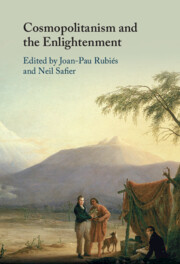Book contents
- Cosmopolitanism and the Enlightenment
- Cosmopolitanism and the Enlightenment
- Copyright page
- Dedication
- Contents
- Figures
- Contributors
- Preface
- Acknowledgments
- Introduction
- 1 Enlightenment Cosmopolitanism in Perspective
- 2 The Cosmopolitan Paradox
- 3 Diderot’s Conjectural History and the History of “Monstrous Nature”
- 4 Geographies of Cosmopolitanism
- 5 The Imperial, Global (Cosmopolitan) Dimensions of Nonelite Colonial Scribal Cultures in the Early Modern Iberian Atlantic
- 6 Gendered Cosmopolitanism?
- 7 Cosmopolitanism and the Creation of Patriotic Identities in the European Enlightenment
- 8 A Cosmopolitanism of Countervailing Powers
- 9 Cosmopolitanism and Civil War
- Afterword
- Index
3 - Diderot’s Conjectural History and the History of “Monstrous Nature”
Published online by Cambridge University Press: 16 March 2023
- Cosmopolitanism and the Enlightenment
- Cosmopolitanism and the Enlightenment
- Copyright page
- Dedication
- Contents
- Figures
- Contributors
- Preface
- Acknowledgments
- Introduction
- 1 Enlightenment Cosmopolitanism in Perspective
- 2 The Cosmopolitan Paradox
- 3 Diderot’s Conjectural History and the History of “Monstrous Nature”
- 4 Geographies of Cosmopolitanism
- 5 The Imperial, Global (Cosmopolitan) Dimensions of Nonelite Colonial Scribal Cultures in the Early Modern Iberian Atlantic
- 6 Gendered Cosmopolitanism?
- 7 Cosmopolitanism and the Creation of Patriotic Identities in the European Enlightenment
- 8 A Cosmopolitanism of Countervailing Powers
- 9 Cosmopolitanism and Civil War
- Afterword
- Index
Summary
Writing his contributions to Raynal’s Histoire philosophique et politique des Deux Indes, Diderot developed a peculiar perspective on how to rethink human society according to the ideals of the Enlightenment. The histories of the European conquest of the world unveiled a cultural energy that displayed the contradictory impulses of cruel desire for domination and benevolence. Ferocity and humanity sprang from the same physical constitution of mankind. However human history, like natural history, was not uniform. Monstrous anomalies could not, and were not, ignored, but had to be interpreted through the philosophical language of reason and historical experience. The European colonial conquests in fact showed four types of social monstrosity in action. The first tree, familiar from the example of the Spanish empire, were cruelty, greed and religion. Despotism was the fourth and most insidious category of monstrosity, because both the despots and their subjects lost their humanity. Philosophical history, nonetheless, also offered a glimpse of what a rational society could be like, by revealing the true roots of the natural, civil and religious codes. The cosmopolitan ideal corresponded to a natural code that offered the principles of pity and natural right through which a free society might be founded, one where the mutual relationship between morals and politics could be re-established on more rational grounds.
- Type
- Chapter
- Information
- Cosmopolitanism and the Enlightenment , pp. 91 - 111Publisher: Cambridge University PressPrint publication year: 2023

